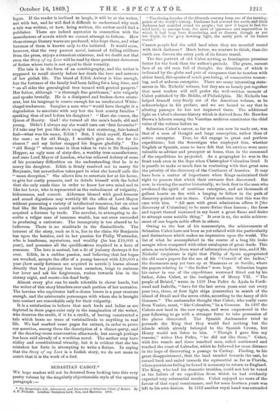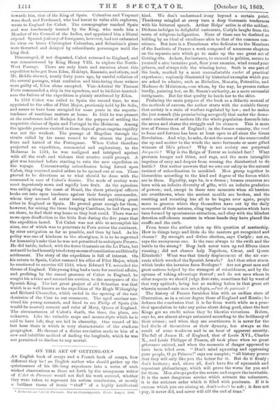SEBASTIAN CABOT.* WE hope readers will not be deterred from
looking into this very pretty volume by the singularly objectionable style of the opening paragraph :—
* The Remarkable Life, Adventures, and Discoveries of Sebastian Cabot, of Bristol. By J. F. Nichollm. London: Sampson Low, Son, and Marston. 1869. " The closing decades of the fifteenth century form one of the turning- points of the world's history. Darkness bad covered the earth, and thick darkness had mantled round its people ; but now it began to feel the solid land ; to emerge from the mire of ignorance and superstition in which it had long been floundering, and to discern, though as yet but dimly, in the grey dawning light, the misty path of its future- travel."
Cannot people feel the solid land when they are mantled round with thick darkness? Much better, we venture to think, than the earth can discern the misty path of its future travel.
The fine portrait of old Cabot serving as frontispiece promises better for the book than the author's prelude. The grave, earnest face of an old man full of thought, the direction of which is indicated by the globe and pair of compasses that he touches with either hand, this speaks of much pondering, of consecutive reason- ing, and of arduous enterprise. There are many interesting state- ments in Mr. Nicholls' volume, but they are so loosely put together that most readers will still prefer the well-written memoir of Cabot published by Mr. Biddle, of Philadelphia. Mr. Nicholls has helped himself very freely out of the American volume, as he acknowledges in his preface, and we are bound to say that in altering passages he has not improved them. The additional light on Cabot's obscure history which is derived from Mr. Rawdon Brown's labours among the Venetian archives constitutes the chief value of the volume before us.
Sebastian Cabot's career, as far as it can now be made out, was that of a man of thought and large conception, rather than of active enterprise. True, he did engage in great and perilous expeditions ; but the Sovereigns who employed him, whether English or Spanish, seem to have felt that his services were more valuable as adviser and prompter at home, than in the command of the expeditions he projected. As a geographer he was in the front rank even in the days when Christopher Columbus lived. It is puerile to make so much fuss in contesting with that great man the priority of the discovery of the Continent of America. It may have been a matter of importance when Kings maintained their right to possess that which their servants first discovered. But now, in viewing the matter historically, we look first to the man who awakened the spirit of maritime enterprise, and set thousands of gallant hearts on fire with a longing to follow in the path of discovery pointed out to them. Cabot confesses that this was the case with him. " All men with great admiration affirm it [the discovery of Columbus] to be more divine than human ; the fame and report thereof increased in my heart a great flame and desire to attempt some notable thing." It ever is so, the noble achieve- ment of one begets noble effort in others.
Owing to the loss of his manuscripts, the achievements of Sebastian Cabot have not been as yet related with the particularity and distinctness which makes an impression upon the world. The list of what he accomplished in the course of a long life looks meagre when compared with other catalogues of great deeds. This arises, as we believe, from want of information about him, and if Mr. Nicholls' conjecture is right that Philip of Spain appropriated the old man's papers for the use of his " Council of the Indies," the documents may yet turn up at Simancas or at Seville, where the papers relating to " the Indies " were kept. Sebastian began his career in one of the expeditions westward fitted out by his father, John Cabot, at the instigation of Henry VII. " The people of Bristol," wrote in 1499 Don Pedro de Ayala to Ferdi- nand and Isabella, " have for the last seven years sent out every year two, three, or four light ships (caravelas) in search of the island of Brazil and the seven cities, according to the fancy of this. Genoese." The ambassador thought that Cabot, who really came from Venice, must, " like Columbus," be a Genoese. In 1497 the Cabots saw land in the new region, and were empowered in the year following to go with a stronger force to take possession of the places discovered. The Spanish Ambassader tried to persuade the King that they would find nothing but the islands which already belonged to the Spanish Crown, but Henry would not listen to him. "Though I gave him my reasons," writes Don Pedro, " he did not like them." Cabot, with five vessels and three hundred men, sailed northward and reached the coast of Labrador, which he followed for some distance in the hope of discovering a passage to Cathay. Finding, to his. great disappointment, that the land trended towards the east, he turned back and sailed towards the equinoctial as far as Florida, where provisions failing he found it necessary to return to England.. The King, who had his domestic troubles, could not but be vexed at the failure of an expedition from which he had evidently expected very substantial results. Cabot enjoyed no more of the favour of that royal countenance, and for some fourteen years was left to his own devices. In 1512 another royal hand was extended
towards him, that of the King of Spain. Columbus and Vespucci were dead, and Ferdinand, who had learnt to value able explorers, wrote to England for Cabot. The cosmographer reached Spain and was handsomely treated by the King, who made him a Member of the Council of the Indies, and appointed him a liberal stipend. Spanish jealousy of foreigners, however, had not exhausted its virus on brave Christopher Columbus, and Sebastian's plans were thwarted and delayed by subordinate personages until the king died.
Discouraged, if not disgusted, Cabot returued to England, and was commissioned by King Henry VIII. to explore the North- west Passage. There are only hints and surmises about this expedition to be got from Eden, Ilakluyt, Ramusio, and others, and Mr. Biddle showed, nearly forty years ago, by careful collation of the several passages, what confusion and blundering these writers were guilty of, Eden alone excepted. Vice-Admiral Sir Thomas Perte commanded a ship in the squadron, and to his faint-hearted- ness the failure of the expedition is plainly attributed by Eden.
In 1518 Cabot was called to Spain the second time, he was appointed to the office of Pilot Major, previously held by De Solis, and seems to have been occupied for some years in the superin- tendence of maritime matters at home. In 1524 he was present at the conference held at Badajoz for the purpose of settling the respective claims of Spain and Portugal to the Moluccas. Among the ignoble passions excited in those days of great emprise cupidity was not the weakest. The passage of Magellan through the straits called by his name roused to the utmost the jealous fears and hatred of the Portuguese. When Cabot therefore projected an expedition, commercial and exploratory, to the Moluccas in 1524, he was maligned and intrigued against with all the craft and violence that avarice could prompt. A plot was hatched before starting to ruin the new expedition on the voyage. Untrustworthy subordinates being forced upon Cabot, they received sealed orders to be opened out at sea. These proved to be directions as to what should be done with the command in case of Cabot's demise. The seeds of mutiny were most ingeniously sown and rapidly bore fruit. As the squadron was sailing along the coast of Brazil, the three principal officers broke out into open insolence against their foreign commander, whom they accused of never having achieved anything great either in England or Spain. He proved great enough for them, however, for seizing the three haughty Castilians, he had them put on shore, to find their way home as they best could. There was no more open disaffection in the little fleet during the five years that the expedition lasted. Yet Cabot was not able to accomplish his aims, one of which was to penetrate to Peru across the continent, by river navigation as far as possible, and then by land. As his policy was one of kindness to the aborigines, it is to be regretted for humanity's sake that he was not permitted to anticipate Pizarro. He did battle, indeed, with the fierce Guaranis on the La Plata, but not until he had honestly tried every means of conciliation and friendly settlement. The story of the expedition is full of interest. On eis return to Spain, Cabot resumed his office of Pilot Major, which he continued to exercise till 1548, when Edward VI. ascended the throne of England. This young king had a taste for nautical affairs, and profiting by the casual presence of Cabot in England, he sought his advice and secured his services, to the annoyance of the Spanish King. The last great project of old Sebastian was that which is so well known as the expedition of Sir Hugh Willoughby and Richard Chancellor, which ended in the opening of the vast dominion of the Czar to our commerce. The aged mariner sur- vived his young monarch, and lived to see Philip of Spain (his would-be master) consort and ruler of Mary, Queen of England. The circumstances of Cabot's death, the time, the place, are unknown. Like the valuable maps and manuscripts which he is said to have left, they are hid in obscurity. One record of his last hour there is which is very characteristic of the studious geographer. Ile dreamt of a divine revelation made to him of a new and infallible method of finding the longitude, which he was not permitted to disclose to any mortal.































 Previous page
Previous page